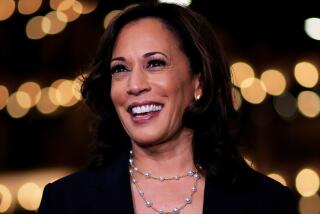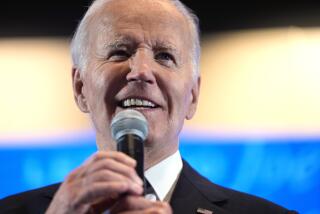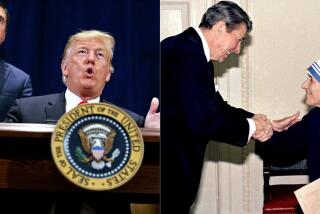Advisers Plan President’s Role as Reagan Appears Ready to Assist Bush Campaign
- Share via
WASHINGTON — The White House on Thursday began taking down the artificial wall it had erected between President Reagan and George Bush’s presidential campaign, as spokesman Marlin Fitzwater indicated that with the vice president about to claim the party’s presidential nomination, the President would soon abandon his public neutrality and begin campaigning for him.
But Republicans with close ties to both the White House and the Bush campaign warned that while Reagan remains a popular figure with Republican voters, his role in the 1988 campaign must be carefully orchestrated to avoid overshadowing the party’s nominee and--at this stage--to avoid drawing too much attention to any single Democratic candidate by launching sharp attacks on him.
Until Thursday, Reagan and his aides had scrupulously avoided any public acknowledgement of his private preference for Bush, and insisted that he would not jump into the campaign until the Republican National Convention met in New Orleans in August--or at least until one candidate had the nomination sewn up.
Dole Decision a Factor
But two days after Kansas Sen. Bob Dole dropped out of the race, Fitzwater chipped away at that wall, telling reporters:
“The President has always wanted to get involved in the political process as soon as possible. It’s simply that his position of neutrality requires that it could not happen until after the convention. But with the vice president now having the required number of delegates, or very close to it, and the reality of the situation being that he could well have them pretty soon . . . he could decide to do some events earlier. I simply want to open the door to this next prospect.”
According to a count by the Associated Press, Bush has more than 800 of the 1,139 delegates needed to win the GOP nomination. The only other candidate remaining in the race, former religious broadcaster Pat Robertson, has 17.
By joining the campaign for a successor, Reagan, in effect, also begins to close the door on his presidency, with only two major events--summits in Moscow in late May and Toronto three weeks later--on his agenda.
Foresee Limited Role
Republican political planners see a limited role for the President at the New Orleans convention to avoid dominating the proceeding at Bush’s expense. Under one plan being given some consideration, according to a GOP adviser, Reagan would address the convention on the first night, and then return to his ranch northwest of Santa Barbara, possibly appearing at the convention only via video at the end of the gathering.
One former White House staff member now working for Bush said that in coming months, Reagan’s help should not be misused so that he ends up turning a spotlight on, say, Gov. Michael S. Dukakis of Massachusetts, locked with the Rev. Jesse Jackson in a battle for front-runner status in the race for the Democratic presidential nomination.
“You increase the status of a Dukakis if Ronald Reagan goes out there and attacks him before he’s the nominee,” this source said, speaking on the condition of anonymity. “You almost create a sympathy factor for him. Why help him out giving him the attention?”
Rather, reflecting a view expressed by White House staff members plotting the President’s political role, he said: “Reagan can be a tremendous help in unifying the party. And he helps you a great deal with independent voters.”
Indeed, the efforts at pulling together the elements of the party have been under way in the Bush campaign this week, with the vice president appearing on a podium with one of his former rivals, Rep. Jack Kemp of New York, and Dole urging unity to help defeat the Democratic candidate in November.
Specific Action Undecided
Fitzwater, meanwhile, said specific plans for Reagan’s campaign activity have not been drawn up, and that he might not begin an active campaign role until after the Moscow summit.
The Bush adviser cautioned that a particularly aggressive Reagan role risks “detracting overly from the nominee.”
“This is a critical time for Bush in developing his issue stance more thoroughly than he has during the primary campaign,” he said.
Another Republican adviser who has not been involved in the Bush campaign said the best use of Reagan--who continues to receive approval ratings above 60% in public opinion polls--would be as a campaigner who can draw contributions to party coffers, helping to build up a war chest for GOP get-out-the-vote efforts in November and other party activities that spill over to help the presidential candidate, but would not count toward Bush’s campaign expenditure limit.
More to Read
Get the L.A. Times Politics newsletter
Deeply reported insights into legislation, politics and policy from Sacramento, Washington and beyond. In your inbox twice per week.
You may occasionally receive promotional content from the Los Angeles Times.










